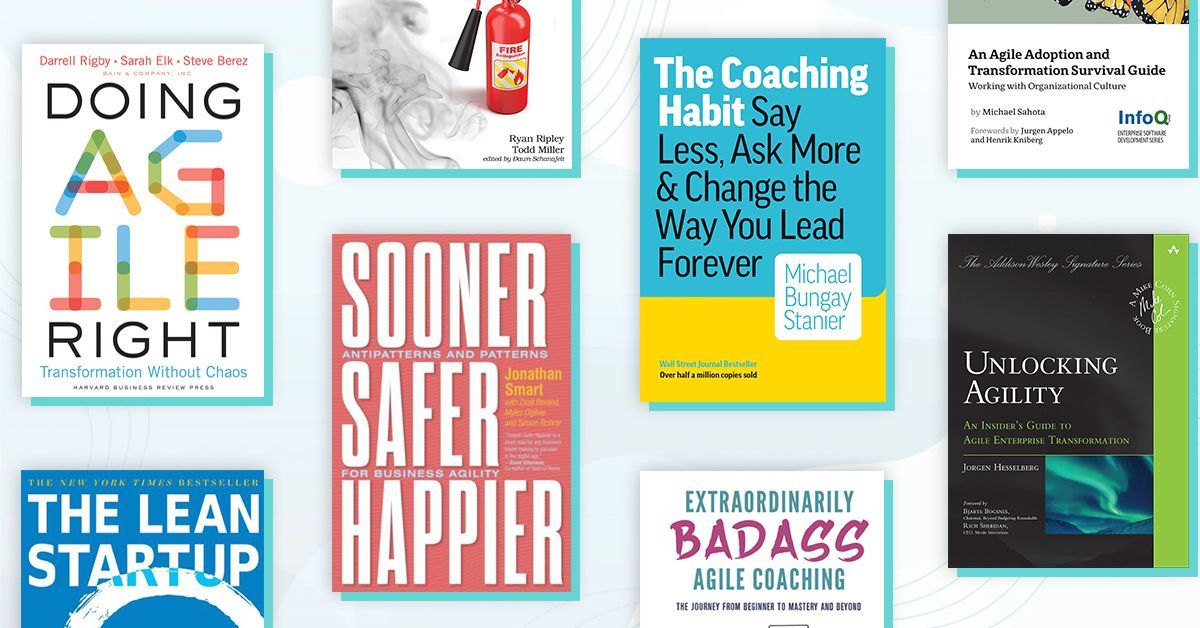Agile Books: a collection to guide your next steps
This article compiles 15 of the most insightful books on agile development, product management, and team design.

The world of software development moves fast, and agile methodologies help teams build better products through adaptability, collaboration, and continuous improvement. For both new and experienced practitioners, books provide invaluable wisdom into agile values, frameworks like Scrum and Kanban, and practical techniques for delivering software that delights users.
The classics and cutting-edge books on this list offer actionable advice for succeeding with agile. Foundational works explain values and mindsets like the Agile Manifesto and lean thinking. Guides for Scrum, XP, Kanban, and other frameworks help practitioners apply agile concepts. Experienced coaches and managers share hard-won lessons on leading agile teams, organizations, and enterprises. Finally, books on lean startup, design, and analytics provide tactics for building products that customers love.
Agile is as much about mindset as methodology. With insights from these authors, software teams can deliver better products while cultivating engaged, empowered, and creative cultures. Both new and seasoned agile practitioners will find ideas to improve their next sprint, project, and product.
Whether you're an engineer looking to sharpen your skills, a leader aiming to transform team culture, or an entrepreneur searching for the lean startup advantage, these books will provide knowledge and inspiration.
What books will you add to your agile bookshelf?
Foundations of Agile
The first two books establish foundational agile values and mindsets that underpin modern software practices. Key ideas include adapting plans based on empirical learning, iterative development to quickly test ideas, and early delivery of value to customers. These books move beyond rigid process to focus on responding to change, continuous improvement, and releasing working software often. Together, they provide an essential introduction to agile principles and lean thinking.
Running Lean by Ash Maurya
Running Lean introduces a lean, iterative approach to launching new products. Maurya advocates adapting plans based on empirical data rather than rigidly following initial assumptions. This book provides specific steps for identifying problems, testing solutions, and harnessing continuous learning through rapid build-measure-learn loops. Running Lean will help teams quickly validate ideas to find product/market fit.
The Phoenix Project by Gene Kim
Backed by years of IT research, The Phoenix Project uses a fictional story to bring data-driven insights to life. The novel follows an IT manager tasked with saving a critical company project to his company's future that is behind schedule and over budget. Through this engaging business narrative, the authors vividly demonstrate principles studied in depth by the State of DevOps reports and other research.
Core techniques illustrated include limiting work-in-progress, test automation, and fast feedback loops from code to customer. Bringing research to life in story form, The Phoenix Project will enlighten development teams seeking to move from software bottlenecks to high-performance delivery.
Scrum Framework
Developed in the 1990s, Scrum has become one of the most widely adopted agile frameworks. The next several books provide an in-depth look at Scrum fundamentals, roles, artifacts, and best practices. They offer practical guidance and insights for successfully applying Scrum methods on projects and products. Whether you're new to Scrum or an experienced practitioner, these books will deepen your knowledge and appreciation for this transformative framework. You'll find actionable tactics for implementing Scrum, as well as big picture perspectives on why it works when embraced fully. Let these authors be your Scrum masters as you level up your expertise.
Scrum: The Art of Doing Twice the Work in Half the Time by Jeff Sutherland
This book by Scrum co-creator Jeff Sutherland provides a comprehensive overview of Scrum fundamentals. It explains the Scrum roles, artifacts, and ceremonies that enable teams to work together more effectively. Sutherland delivers insights both broad and deep into the values and practices that allow Scrum teams to accomplish more in less time. He balances high-level perspectives on self-organization and team flow with very tactical advice on sprint planning, stand-ups, retrospectives and more. For both Scrum beginners and experts, this book is an invaluable guide to optimizing productivity, engagement, and results.
Essential Scrum by Kenneth S. Rubin
Essential Scrum provides a highly visual, practical guide to Scrum concepts and practices. Using illustrated examples, author Kenneth Rubin walks through Scrum roles, artifacts, and meetings in a step-by-step fashion. This book translates Scrum processes and workflows into an easily digestible visual language. It serves as an essential handbook for Scrum teams looking to improve their implementation of everything from product backlogs to sprint retrospectives. With straight-forward explanations supplemented by diagrams and illustrations, Essential Scrum makes the Scrum framework approachable and concrete.
Scrum: A Breathtakingly Brief and Agile Introduction by Chris Sims and Hillary Louise Johnson
As its name suggests, this pocket-sized book provides a high-level yet comprehensive introduction to Scrum. Authors Chris Sims and Hillary Louise Johnson condense the fundamentals of Scrum into a compact, readable format. In just over 100 pages, they explain Scrum roles, artifacts, and events with clear examples. This book provides a breathed overview of Scrum that is approachable for beginners yet substantial enough to serve as a helpful reference guide. For readers short on time looking to quickly grasp Scrum basics, this focused primer distills the framework down to its essence.
The Scrum Field Guide by Mitch Lacey
In The Scrum Field Guide, Mitch Lacey provides practical everyday advice for implementing Scrum. This guide tackles the common challenges and questions that arise when teams start using Scrum. Lacey draws on his extensive experience coaching and guiding companies through agile adoption. He covers topics ranging from creating user stories to handling interrupts during the sprint. The field guide format, organized by specific issues, allows readers to quickly find solutions to the real-world problems they encounter with Scrum. For practitioners looking to improve their Scrum practice, The Scrum Field Guide offers an invaluable collection of tips and techniques.
Succeeding with Agile by Mike Cohn
In Succeeding with Agile, Mike Cohn provides a comprehensive guide to transitioning teams and organizations to agile methodologies like Scrum. This book offers tips and strategies for getting started, coaching team members into new roles, structuring teams, integrating with a traditional development organization, and scaling agile practices. Cohn draws on his extensive experience helping companies adopt agile to provide practical guidance for each stage of the transition. For leaders and managers looking to spread Scrum across an organization, Succeeding with Agile is an indispensable resource for the change journey.
Agile Product Management
Delivering successful products requires more than just solid engineering. The next books provide critical insights on leading agile product development and embracing customer-focused product design. They cover effective product management, gathering customer feedback, and innovating through rapid experimentation. Whether you manage products, lead development teams, or want to better understand your end users, these books will equip you with knowledge to build outstanding products that customers love. You'll learn frameworks like lean startup and impact mapping that drive alignment between business value and technical execution. Let these authors be your guide to becoming a product expert within agile environments.
Lean Analytics by Alistair Croll and Benjamin Yoskovitz
Lean Analytics provides a practical framework for using data to drive startup success. Co-authors Alistair Croll and Benjamin Yoskovitz identify actionable metrics and analytics strategies specifically for internet and technology companies. They explain how to measure the right things at the right time based on company stage and business model. This book demonstrates how to harness empirical data and insights to iterate products and find product/market fit faster. For entrepreneurs and product teams embracing agile development, Lean Analytics is an indispensable guide to startup metrics and data-informed decision making.
The Lean Startup by Eric Ries
In The Lean Startup, Eric Ries outlines his influential approach for driving business growth through rapid iteration and innovation. This book provides a blueprint for continuously testing hypotheses, adapting products based on customer feedback, and speeding time-to-market. Ries' lean startup methodology draws on agile principles and Scrum's empirical process control. He advocates building minimum viable products, measuring key metrics, and learning quickly from real customer behavior. For entrepreneurs and companies seeking to sustain innovation, The Lean Startup offers vital strategies for unleashing growth through nimble product development.
User Story Mapping by Jeff Patton
In User Story Mapping, Jeff Patton presents a simple yet powerful technique for building product roadmaps focused on user needs. Story mapping helps teams align user perspectives with business goals and technical implementation. This book explains how to create story maps collaboratively during backlog grooming and sprint planning. Readers learn how story mapping reveals richer user insights, enables better planning and prioritization, and creates a shared vision across the team. For agile product and development teams, User Story Mapping is an indispensable guide to crafting outstanding products that deliver value to users and the business.
Impact Mapping by Gojko Adzic
In Impact Mapping, Gojko Adzic provides a pragmatic mindset, toolset, and visual notation for building products that deliver exceptional business outcomes. Impact maps create alignment between project teams and company leaders on the "why" behind products and key results expected. Adzic's impact mapping method complements agile development, enabling teams to plan and build products that make a meaningful difference for the business. This book gives readers concrete skills for impact-focused product strategy, roadmapping, and release planning. For teams creating mission-critical products, Impact Mapping is an essential guide to planning for maximum business impact.
Sense and Respond by Jeff Gothelf and Josh Seiden
In Sense and Respond, Jeff Gothelf and Josh Seiden present a framework for building responsive, customer-focused products and companies. This book provides guidance on continually sensing market changes and user needs, then responding with rapid experiments and iterations. The authors draw on lean startup principles and agile development to help teams design adaptive systems, processes, and culture. With compelling examples and practical techniques, Sense and Respond offers a model for creating organizational fitness and thrivability in turbulent market environments. For product teams aiming to delight ever-evolving customers, this book provides invaluable strategies for embracing agility at every layer of the business.
Inspired: How to Create Tech Products Customers Love by Marty Cagan
In Inspired, Silicon Valley product management expert Marty Cagan provides an insider's guide to building successful technology-powered products. Cagan draws on decades of experience coaching some of today's most valuable tech companies. He introduces best practices for product discovery, design, delivery, and leadership. This book covers how to create empowered product teams, gather user insights, prototype effectively, and leverage analytics. With engaging stories and examples, Inspired offers a masterclass in creating exceptional products that solve real customer problems. For any product manager, leader, or team, it is an indispensable guidebook for shipping products users love.
Culture and Teams
Building great products requires more than just adopting the right process - it's ultimately enabled by people and culture. The following books provide wisdom into the "soft" side of agile development, with insights on team dynamics, leadership, and organizational change. They will help transform not just what you build, but how you build together. You'll learn principles for structuring motivated, collaborative teams. And you'll find strategies for gradually evolving company culture rather than mandating overnight transformations. Let these authors inspire you to not just deliver great products, but also nurture high-performing, fulfilled teams.
High Impact Tools for Teams by Stefano Mastrogiacomo
In High Impact Tools for Teams, agile coach Stefano Mastrogiacomo shares techniques for empowering teams and cultivating culture. This practical workbook contains battle-tested exercises for bringing agile values to life. Mastrogiacomo draws on years of experience working with global organizations to provide activities focused on trust, accountability, and continuous improvement. From icebreakers to retrospectives, the tools in this handbook unleash the talents of agile teams. For coaches, Scrum masters, and leaders seeking to engage people and improve how they work together, High Impact Tools for Teams provides an indispensable toolkit.
Scrum: A Revolutionary Approach by Jeff Sutherland
In this book, Scrum co-creator Jeff Sutherland focuses on how Scrum empowers teams and unlocks their productivity. He provides insights into the values, mindsets, and leadership principles that allow Scrum teams to accomplish more than they believed possible. Sutherland shares autobiographical stories of teams he has coached to highlight Scrum’s transformative cultural impact. For leaders looking to boost team engagement and flow, Scrum: A Revolutionary Approach provides inspiration and practical knowledge. This book will help organizations use Scrum not merely as a process, but as a philosophy that cultivates creative, joyful, and resilient teams.
Peopleware by Tom DeMarco and Timothy Lister
The classic Peopleware examines how to cultivate teams and cultures that deliver exceptional work. Authors Tom DeMarco and Timothy Lister reveal that the key to productivity is growing motivated, collaborative teams. They share research-backed insights on team dynamics, workplace environment, management approaches, and organizational culture. DeMarco and Lister use wit and wisdom to advocate for trusting employees, fostering creativity, and human-centric offices. Published back in 1987, Peopleware remains fresh and relevant today. The book provides timeless understanding of the "human factors" that enable productive, energized teams.
Level Up Your Agile Game
This collection represents the canon of agile software development. While no bookshelf can cover everything, these 15 titles provide enlightening skills and mindsets for succeeding with agile.
This essential reading list will help you deliver valuable products iteratively, leverage data to make decisions, and unlock your teams' full potential. Agile is not just a process, but a mindset. With wisdom from these books, you can lead change that ripples through teams, products, and software delivery culture.
Key takeaways include:
- Apply agile values
Adapt to change, satisfy customers, empower teams. - Mastery
Master frameworks like Scrum through rigorous practice and continuous improvement. - Become a product expert
Discover user needs, design iteratively, analyze data. - Optimize team culture
Motivate through autonomy, mastery, and purpose. - Focus on business impact
Map product strategy to company goals. - Accelerate innovation
Experiment ruthlessly, get customer feedback fast.
These books will help you deliver products users love, unlock your team's potential, and lead with an agile mindset. Master their wisdom, and you will level up your agile practice from project to product to enterprise scale. Choose one book to start, or explore them all over time. Let these agile masters guide you on the never-ending journey of improvement.
Your team, company, and customers will thank you.
The future awaits those who can embrace agility.

